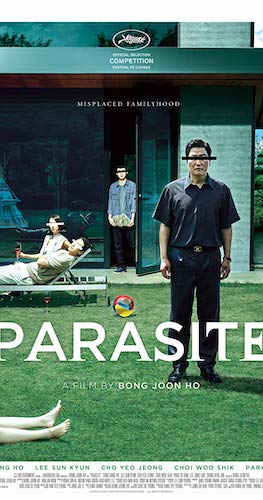Parasite
Editor’s Warning: This is a review of a film shown at the Toronto International Film Festival. There is a chance that this film will not be accessible for a specific period of time, depending on the film’s release date. Be aware that there may be slight spoilers. Proceed at your own discretion.
Bong Joon-ho has been warning us about class struggles through most of his filmography at this point. Even his English-language debut Snowpiercer was released at a time where the idea of a working class apocalypse was a slight exaggeration. With climate scares, political peril, and crippling debts, Snowpiercer isn’t quite as strange as it seemed only six years ago. Still, Joon-ho is not exactly ahead of the pack, but he is fully aware of all situations at once. You can place any of his films here, but they all share similar sentiments: the world’s just not in a pretty, cohesive place right now. His works also emit some sort of extreme nature, like a Guillermo Del Toro work of fantasy. You can feel his films’ messages, but you know this is all a work of fiction because of the slight camp, and the slightly alienating filmmaking choices. Returning to full-on Korean cinema, Joon-ho had to make a bigger statement than ever. He’s made his mark. Now, he has to say what’s really on his mind, now that all eyes are on him.
Thus, Parasite was born. His latest feature won the Palme d’Or at the Cannes Film Festival (with flying colours). The mysterious trailers have left internet users guessing for months now. What could this film be about? Within those months, the unanimous acclaim that insists Parasite walks away with every foreign film award under the sun has only grown stronger. Like the film itself, its legacy has been a fire that quickly spreads, making its mark. You don’t know where it will go, but you know it will go somewhere, and leave traces in its path. There’s good reason for this. Parasite is the kind of film you can sense will be terrific within its first minutes. By the end, you’ll know that you’ve never seen anything like it.
A portrait of a smiling, yet struggling, family.
Parasite is enough of a satire to create a slightly different-feeling world, despite all of its components being extracted from reality. When the exterminator fumigates a street in the opening sequences, it feels like armageddon. The way Joon-ho magnifies certain parts of this film insists some forms of exaggerations: not that whatever happens here isn’t plausible, but rather you’re seeing how grotesque it all is. The Kim family lives in squaller. That is as plain as day. Seeing the Kim kids glued to their phones is an early suggestion that this is not a story of our world. As the film continues, you realize “Wait, this is our world”, and we’re all probably that obsessive with our devices. There’s nothing too farfetched about Parasite at all, even with the hysteria that ensues later on. It’s actually devastating to think about. The most insane moments are all entirely possible; perhaps less possible than the film suggests, but the margin of possibility alone is deafening.
The film starts off as a series of attempts to enjoy the good life. The Kim family does this by assimilating themselves into the Park household: a wealthy family that has hired help. The Kims know how to get by, so they are quick to come up with deceiving ways to all take up different responsibilities in this household, all while not letting the Park family know they are all related. In a very surreal way, seeing all of these family members work in a house that is not there is a startling portrait: this is the ultimate domestic dream, and it’s kind of real for the Kims.
The Park family parents engaging in a private conversation.
You think you understand where Parasite is going from there. After all, it’s in the title of the film. This is one family usurping another from their own home. That’s how it goes, right? Well, Joon-ho informs us early not to be too comfortable. He does so by pulling off some fantastic genre bending. Parts of Parasite are darkly comedic, but other moments are just flat out classic comedy without the blurred lines. Other scenes are depressing, with no signs of light anywhere to be found. The middle ground is an excessively in-your-face satire, with imagery that will make you second guess what you are actually witnessing. All of this takes place during a fast-paced environment, so nothing just drags along. Despite the speed, nothing feels rushed in Parasite. There is so much narrative goodness, that you know there is more to come, and you have no idea as to what it may be.
Joon-ho allows his film to not really have a home. It isn’t a straight up dark comedy, nor is it simply a thriller. Like the subjects in the story, Parasite is without a steady foundation, but it makes do by hopping around and making each new umbrella term home. It’s the connection of styles with pure finesse; the achievement of a film that truly feels of its own nature, and close to impossible to apply only one genre label to. With this in mind, you must know that nothing will be as it seems. If the feel of the film is of no specific category, you can expect the story to not be so simplistic either.
Son Ki-woo observing the ideal displays of a functioning, successful, happy family.
SPOILERS
The Kim family assume they can take over the luxuries of the Park family, mainly because they have worked against life for as long as they can remember. If they try their best and struggle, why don’t they deserve the good life, too? Well, the film does a complete flip when we realize that this is far from the only family to have a similar idea. The former housekeeper Moon-kwang was also using the Park household as a means of protecting her loved ones (mainly her husband, who is in hiding in the Park family’s hidden basement). When you have the rug pulled from underneath you halfway through the film, you simply have absolutely zero ideas as to where Parasite will go next. It’s an exhilarating feeling. For once, you have more than just a final act remaining, and you can’t predict the outcome from a mile away. Like father Ki-taek says, having no plan is the best plan, because there is no way for life to go against your missions. Parasite is not completely devoid of structure, but it allows its circumstances to dictate many of its outcomes.
We see two poor families try to claim a household, whose owners have absolutely no idea that this war is even happening. In fact, they don’t even know that they are housing others at all (whether it be the Kim family for one evening, or Moon-kwang’s husband who has been in hiding for four years). Eventually, things escalate too much, and nobody truly wins. With families torn apart or completely eviscerated, Parasite ends with a household that remains, while people perished. Another family takes over the house, as if it had not seen any blood at all (despite the many news reports that came out after the bloodbath). Ki-woo vows to work hard and win that house fair and square, with his father (in hiding in the basement) able to come out not as a scrounger, but as a human being. We see the dream happen, and the image fades for the credits to roll. No credits roll just yet, though. Instead, we see Ki-woo vowing to make this happen, and we are left off with the final nail in the coffin. We know Ki-woo will never be able to do this, despite his best intentions. We know his father Ki-taek will forever be stuck feet away from a life of paradise, only to never experience the freedom of it. It is a titanic ending that initiates one final twist, just when we thought we had seen it all.
END OF SPOILERS
The Kim family fighting the storm.
Joon-ho allows Parasite to depict an extremely dark representation of how the world really is. Luxury means having the ability to make any choice whenever you want. Poverty means having to eat right next to your toilet, because it needs to be in the kitchen so all the water comes from one room. There are so many conflicting parallels, and you won’t have to wonder why the Kim family try their best to live a better life vicariously through the means of others. It’s a taste of freedom. It’s minutes — no, seconds — spent away from the place they don’t want to call home. Why do the bother trying to master the creation of pizza boxes for a living, if it will never get them out of their predicament?
Parasite is also an interesting title. It insists that the Kim family is trying to use the Park residence as their host (Joon-ho pun intended), and this is how they will now survive. Parasite also relates to the sickness that inhabits within the minds of the struggling, as if they allow life to operate them on auto pilot, since all of their own decisions cannot fix their situations. For me, Parasite is the bug that allows money to dictate everything for us. We have let this green paper change everything for us. We have let it control us. The primary sickness in Parasite is not from cell phone abuse, starvation, overflowing toilets, poor mistakes made under the influence, the unhealthy longing of someone else, the blindness caused by greed, or anything else that Parasite boasts. The true ailment is the fact that we let pieces of paper get us here in the first place. Currency. Equity. Interest. Debt. Mortgages. Loans. These are all made by humans. These were all abused by humans. These all affect, and even condemn, humans. We’ve let money destroy families, civilizations, and even lives, when it was meant to enhance all of this and make our species wiser and more capable.
The Kim family trying to get rid of the local drunk.
So much of Parasite is unbelievable, but Joon-ho does an excellent job of making sure everything seems plausible. It all makes sense, as much as we don’t want it to. The film itself shouldn’t even make this much sense. How can a film his hideous be this beautiful? How can a ride this full of laughter be this depressing? How can everything seem so farcical, and yet all of it hits close to home for many of us? Forget the never ending post-apocalyptic trains, or species of super pigs that Bong Joon-ho has exposed us to before in his works. Most of his strictly Korean films have warned us that humans are the most perplexing creations ever, and Parasite cements this idea. As much as it is an invigorating cinematic adventure (full of turns, thrills, scares and guffaws), it is also an extreme social-commentary aftertaste that may never leave you at all. We’re beyond having cautionary tales at this point, readers.
Andreas Babiolakis has a Masters degree in Film and Photography Preservation and Collections management from Ryerson University, as well as a Bachelors degree in Cinema Studies from York University. His favourite times of year are the Criterion Collection flash sales and the annual Toronto International Film Festival.










